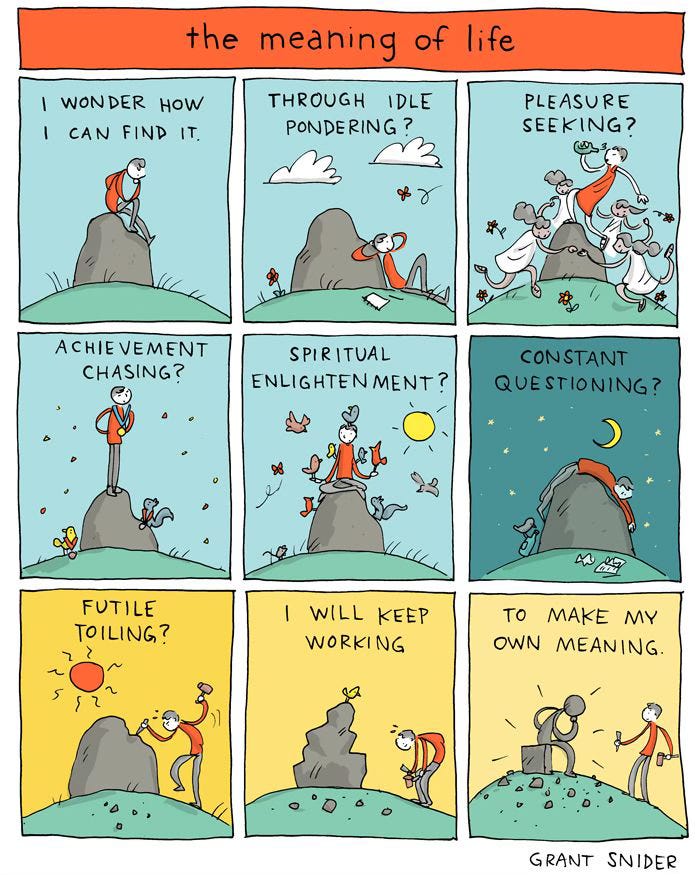Our lives are containers for a million big and small tasks.
Some tasks we love. The rest we tolerate, and a few we abhor.
Tasks we love
As it turns out, what we love comes from our strengths.
When we do what we love, we get into a flow state. When we are in a state of flow, three things happen,
- The more we do it, the more we enjoy it.
- The more we do it, the better we get at it.
- When we do it, 2 hours feel like 2 minutes.
My flow activities
These three flow activities get me as high as a kite.
1. Crafting meaning.
The difference between product and brand, between invisibility and significance, and even between unhappiness and equanimity is meaning.
Meaning is like colour. A room brightens up when we change its wall colour from grey to yellow. A person looks more professional in black, not neon pink. We have a whole pallet of meanings at our disposal. When we change the colour of the meaning we paint people, experiences, and even products with, we can change our lives.
In truth, our lives become our meaning, and vice versa.
If going to an office party means “small talk we are not good at, with people we don’t like,” your wallflower status is guaranteed.
“I only buy Lamy ink pens because German technology is the best and my best friend gifted my first Lamy” transforms a writing instrument into a brand.
“My mother is always nagging me” is laden with resentment. But the minute you change it to, “My mother nags me because that’s the only way she knows how to show love,” you have just opened the door to a more patient interaction.
Meaning shaping is both a science and an art. Too artsy, and we lose rootedness in reality. Too sciency, and we become dull.
After decades of crafting brands, writing brand keys, judging brand moves, trying (and often failing) to read the hidden agendas of people… I believe decoding meaning and then shaping new meaning is my flow state.
It helps that I have a mile-wide, inch-deep knowledge base that is useful when I connect the dots between diverse ideas to synthesize new meanings.
2. Conversations.
I am as curious about people as I am about books. Maybe more. Because books can’t hold conversations.
There’s a cluster of coffee shops close to where I live, where I prefer to meet people. We plan for one hour, but invariably, we lose track of time. I just love listening to people, their stories and how they think and feel.
All the while, my brain ticks away, trying to synthesize what I hear into boxes of meaning that I can package with a neat bow and gift to them.
3. Surprisingly, execution.
You might think I don’t enjoy execution. That I am a ‘head in the clouds-won’t get hands dirty’ kind of person.
On the contrary, I get deep satisfaction from the most mundane, tactical tasks. Tasks that Tim Ferris advises folks to delegate or hire for.
Formatting my dad’s 400+ page books. Running Amazon campaigns, keying in 50+ negative search keywords. Building an Amazon store. Even packaging Amazon/Flipkart orders daily1.
Formatting my articles, tweaking my website, making canva images.
Organising cupboards, cleaning out the hard disk drive, arranging furniture, deep cleaning the toilet.
Even though it might come from a combination of OCD and perfectionism, this minutiae puts me into a blissful flow state.
Start noticing these three things to identify your flow areas
- What do people seek your help on even when you don’t offer it?
- What is effortless for you and difficult for others?
- What would you do even if you were not paid for it?
Tasks we suffer through
A flow activity is not a bed of roses.

Your chosen flow activity can be bloody difficult because it brings a lot of suffering with it.
Sports persons suffer injuries that could maim them for life.
Leaders struggle with imposter syndrome that keeps them up all night.
Robert Green talks about finding an assistant who is ok to suffer months of reading and boredom only for that one masterful insight that makes it all worth it.
We pursue our flow activity despite all the pain because mastering it has become our life’s purpose.
My suffering comes from prioritising the wrong things at the wrong time and so, not managing my energy through the day.
I tend to prioritise my execution tasks in the morning. This means that by 5 PM, I have very little energy left for meaning-making or conversations. I feel I have not accomplished anything cerebral that day, so I get irritable and become a real pain to be around.
Sometimes our suffering is external and uncontrollable.
India’s freedom fighters tolerated violence, jail time, disrespect and even torture for a larger purpose.
You may be tolerating a short-tempered boss, an incompetent team or a long commute for a job you love.
We are willing to suffer because we believe we derive big value in the end. Ergo, the richer the meaning, the more we are willing to suffer.
That’s what I mean when I say that the value of anything is the sacrifice we are willing to make for it.
Meaning is individual to you. It’s personal.

What you think is suffering might be the price of mastery.
So how do we tell apart the suffering that is a necessary rite of passage from the suffering we should walk away from?
Suffering you can avoid
- This suffering drains you.
- It makes you anxious and vulnerable.
- You are not ready to go through it again the next day.
This suffering tends to hold external meaning. You suffer because others are doing better than you. They are ‘winning’ and you are not.
Suffering that’s the price of mastery
- This suffering makes you better at your chosen flow task. Slowly, but steadily.
- Despite yesterday’s pain, you are ready to try again the next day.
- This suffering makes you want to try even harder.
This suffering holds internal meaning. You suffer because you believe it makes you better. You suffer only for yourself, and no other.
Now here’s where it gets complex and very personal. The same suffering can have different meanings for two different people.
A manager who corrects grammar in your emails, makes you practice your speech a 100 times and changes the font on your presentation 10 times can hold different meanings for two different people.
A might hate the suffering, but might still lean into it, knowing that this might be the burnishing their discipline needs, for it to glitter.
B might hate the suffering. Call the manager difficult, and leave.
Maybe B will find their suffering elsewhere. Maybe they missed a golden opportunity to shine. Maybe they didn’t.
There is no good way to know.
It all boils down to the meaning we give to flow and to suffering – choose the suffering that makes it all meaningful in the end.
More ways to connect
- Connect on LinkedIn
- Read the archives
- Subscribe to this Newsletter
1 we are self-publishing Dad’s books. More on that later.
